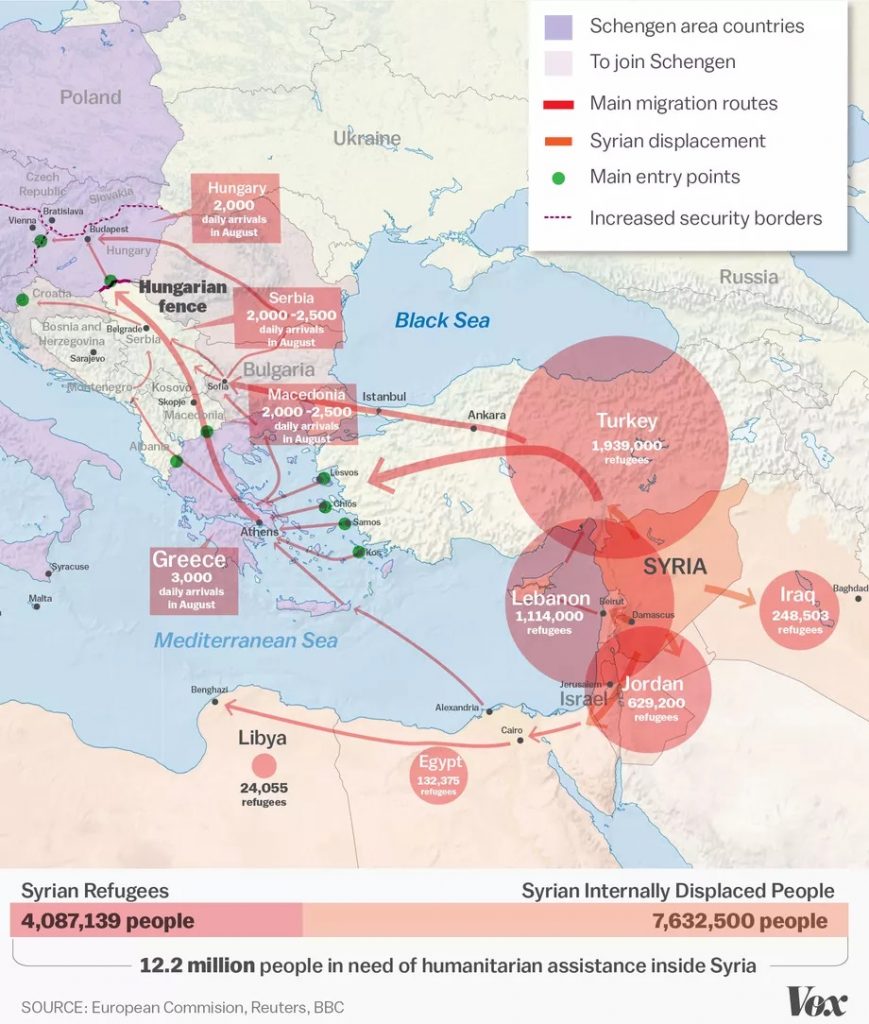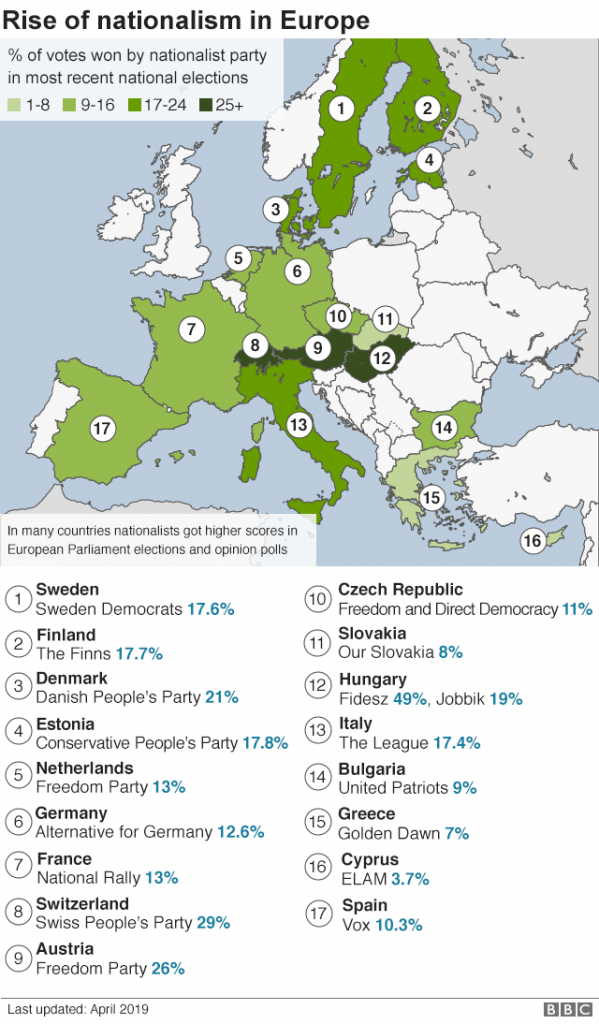Journaling Through THE UNINHABITABLE EARTH

Climate and Refugees
Beginning in 2011, about one million Syrian refugees were unleashed on Europe by a civil war inflamed by climate change and drought—and in a very real sense, much of the “populist movement” the entire West is passing through now is the result of panic produced by the shock of those migrants.
David Wallace-Wells, The Uninhabitable Earth. p. 7
This sentence drops a crucial piece into a puzzle I’ve been pondering for some time. People wonder what lies behind Donald Trump’s steadfast constituency which continues despite his scant ability to lead legislative change. If we ask this question from the tight context of the United States alone, there is hardly a single answer that is satisfying. But when we ponder the rise of right wing governments throughout Europe, suddenly we see the Trump phenomenon as part of an effort to defend White European tradition.
Here’s how that works. There is a spike in refugees from the Middle East and Africa.

They bring different cultures into contact with White Christian cultures. The Europeans feel engulfed and anxious that their traditions are under assault. Political philosophers like Alexander Dugin have a ready to eat philosophy of Western Civilization that feels Christian and noble and suddenly there is a spike in populist governments throughout Europe and in the United States.

The Bible and the Climate Crisis
I’m still in the opening pages of David Wallace-Well’s book, The Uninhabitable Earth. As I read, I have two powerful reactions to this book.
The first is the most scary. There is no hope here. I don’t experience David Wallace-Wells as a sensationalist. He isn’t conjuring up panic in his readers. He has consolidated a mountain of evidence—much of which has already happened such as heat wave deaths in cities worldwide–to support the conclusion that human and most animal life on the planet are moving towards deep distress and probable extinction. All of this will happen in the next century or so. I turn page after page of this well-written ghastly book with no ideas whatever that will counter the sense of doom which will have reached apocalyptic proportions by the time my granddaughter reaches midlife.
My second reaction is that the contours of Wallace-Wells’ predictions are strikingly biblical. Admittedly, they resemble the parts of the Bible that have received the least attention in the last 50 years, namely its eschatology, its view that history presses towards some kind of ending. Nevertheless, the Christian Church which, in the public mind, is equates to Evangelicalism, tends to see climate change as the preserve of lefty social engineers, a group they see as their natural enemy.
There are other reasons why Christians, notably conservative ones, have little to bring to the conversation about the fate of the planet. Their absolutizing of the sin-redemption duality to the exclusion of other themes certainly de-emphasizes creation, ethics, and spirituality as important biblical themes.
But that’s the church, which is not to be confused with the world of the Bible, whose creation theology, judgment themes, missiology, and end times visions bear striking similarities to the thought patterns that Wallace-Wells represents.
I’ll list the most striking ones here.
I
Creation is good, enduring, habitable, and the object of God’s ultimate rescue. This is a kind of mega-theme that begins with the Creator’s declaration that all is “good” (Genesis 1.31). One of the reasons for the world’s goodness is the continuing commitment of God to sustaining it. (Proverbs 8.28-30).
The covenant following the Genesis Flood reinforces the Creator’s commitment never again to permit a catastrophic loss of life, such as the one that killed all but Noah, his family, and representatives of the animal world.
Jesus’ world view is of a fantastically genial environment, which makes striving after food and clothing, (Matthew 6.25-34) worrying about a storm, (Mark 4.35-41) or being frightened of arrest and interrogation downright signs of unbelief. (Mark 13.9-11).
Admittedly, these passages proclaim precisely the opposite of the absolute doom that is predicted by the consensus of climate scientists. We must not read the Bible so simplistically that we dismiss the sober warnings of climate science with the glib—“God’s in control and won’t let any of that happen.” In fact, what the Bible appears to teach is that history-ending upheaval is a part of life and that only after the very worst, such as the Flood, Exile, Crucifixion do we see that the goodness of creation has quietly triumphed. The challenge here is embrace the truth of science with an equally deep confidence that creation is invested with a quality of goodness and divine presence that will work together. There’s a linkage between human misbehavior and upheaval in the created order.
Wallace-Wells is not preachy, but reading his book makes it clear that it is the very worst in human greed and sloth that exacerbates the climate crisis. The concept of global warming is not new. It is 75 years old, was uncovered by oil and gas industry studies, and suppressed. Trump’s withdrawal from the Paris Agreement for the purpose of un-hindering American companies from the daunting task of limiting their carbon emissions is a prime example of replacing long-term global responsibility with near-term business success. People’s addiction to plastic, beef, and urban sprawl are all behind the unfolding catastrophe of an increasingly uninhabitable planet.
II
The biblical connection between justice and ecological upheaval traces a similar path. The ten plagues (Exodus 7 – 12) that struck Egypt, while attributed to God, were natural happenings that may have been occurred one at a time in years past in Egypt. The reader of Exodus can hardly miss the connection between racialized state slavery, constant work, and genocide and the frogs, gnats, and pestilence that disrupts the Pharaoh’s kingdom.
That human wickedness and stupidity is linked to environmental disaster is vividly clear in this passage from the prophet Jeremiah:
I looked
on the earth, and lo, it was waste and void;
and to the heavens, and they had no light.
24 I looked on the mountains, and lo, they were quaking,
and all the hills moved to and fro.
25 I looked, and lo, there was no one at all,
and all the birds of the air had fled.
26 I looked, and lo, the fruitful land was a desert,
and all its cities were laid in ruins
before the Lord, before his fierce anger.
27 For thus says the Lord: The whole
land shall be a desolation; yet I will not make a full end.
28 Because of this the earth shall mourn,
and the heavens above grow black;
for I have spoken, I have purposed;
I have not relented nor will I turn back. (Jeremiah
4.23-28)
A fuller exposition of this passage reveals that the cosmic devastation envisioned here is a consequence of human moral collapse:
‘For my
people are foolish,
they do not know me;
they are stupid children,
they have no understanding.
They are skilled in doing evil,
but do not know how to do good.’ (Jeremiah
4.22)
It is an established biblical theme that creation is continually supported by God. It is God’s promised intention to overcome all chaos, destruction, and to renew all of creation despite the chaos and human injustice that can do so much harm—harm on a scale that The Uninhabitable Earth predicts.
III
God uses human agency to accomplish the glorious ends which God intends. I’ll cite two examples. After Moses and his Hebrew people have escaped from Egypt they suddenly realize that the Pharaoh has ordered his chariots to overtake them. Thinking fast, Moses commands the people to “stand firm” and trust God. This sounds like the ultimate stance of faith in the face of destruction. With a trace of scolding mixed with humor, God says to Moses to command the people instead to start walking into the water. Only after the people start moving does the water start parting. The Red Sea miracle appears dependent on a small act of courage by the people, which is greatly energized by God. (Exodus 14.10-20)
Almost all of the miracles attributed to Jesus in the gospels are activated by some confident activity by ordinary persons. Indeed, the advent of Jesus into the world must wait respectfully for Mary, Jesus’ earthly mother, to give her consent to carry, nurse, and nurture the baby.
Conclusion
The pious stance of faithful trust that everything is going to turn out alright in the face of climate disaster may sound like robust Christian hope, but it is behavior that is incompatible with the muscular faith that crops up again and again on the pages of both testaments.
At the very minimum, present day disciples of Jesus Christ need to bring a sophisticated reading of the Scriptures into conversation with the best climate science as all of humanity marches forward into a frightening future.
Wallace-Wells is actually not technically correct about the lack of an “analogy” for the secular world to grab onto in order to assess the upheaval that almost certainly lies before us. It is now popularly known, and amply cited in The Uninhabitable Earth , that extinction of most living things on a massive scale due to greenhouse gases has happened five times in the history of life on this planet. These extinctions are etched in the geological record and give plenty of reason to believe that a sixth mass collapse of life including human life is in the offing.
The difference between our extinction event and the first five is that this one is unfolding during human history, which is about a million years old. Nothing in human history prepares us for a collapse of this magnitude.
It’s no longer a metaphor to speak of disasters of “Biblical proportions.” The need now is to bring humanity, science, and the Bible into a conversation about what lies ahead.
Patriotism
Reading this book is very hard on the assumption that there is something special about America. This is especially true after plowing through Ed Baptist’s, The Half Has Never Been Told. Writing about slavery in 19th century America, Baptist argues that the United State’s ability to quickly join the industrial world and grab the riches that come with an industrial economy was the result of the convergence of free land, free labor, and free money. In other words, the slave economy leading up to the Civil War rocketed America into economic prominence. Wallace-Wells’ in Uninhabitable Earth says the same thing about the influence of oil in the 20th century. We’re rich largely because of oil.
Of course slavery was morally unsustainable and in conflict with universal standards of human decency. So also is massive oil and coal burning incompatible with a stable natural order. Oil companies have known this since the 1940’s and have been busy making sure that the public is protected from this dire information as long as possible.
Now this series of statements on page 54.
In other words, everybody thought that the Developing World’s path to a comfortable lifestyle was paved with oil.
Of course, this is folly. There’s no time for Asia and Africa to be lifted into their own versions of the middle class because we’ll be burning up the earth in the process.
Says Wallace-Wells:
How does this affect our attitude towards our society? It leaves us unable…
Immanuel Kant came up with two fundamental self-evident principles of human morality. I can remember them from freshman Philosophy 101. One of them is that it is immoral to ever use a human being as an instrument to accomplish some other goal. The other is that it is immoral to do anything that one wouldn’t wish to see everybody do. Our society has violated both of these on a massive scale in enslaving more than 4 million African descent people and in consuming huge amounts of the earth’s treasures and then acting to prevent other countries from doing the same.
